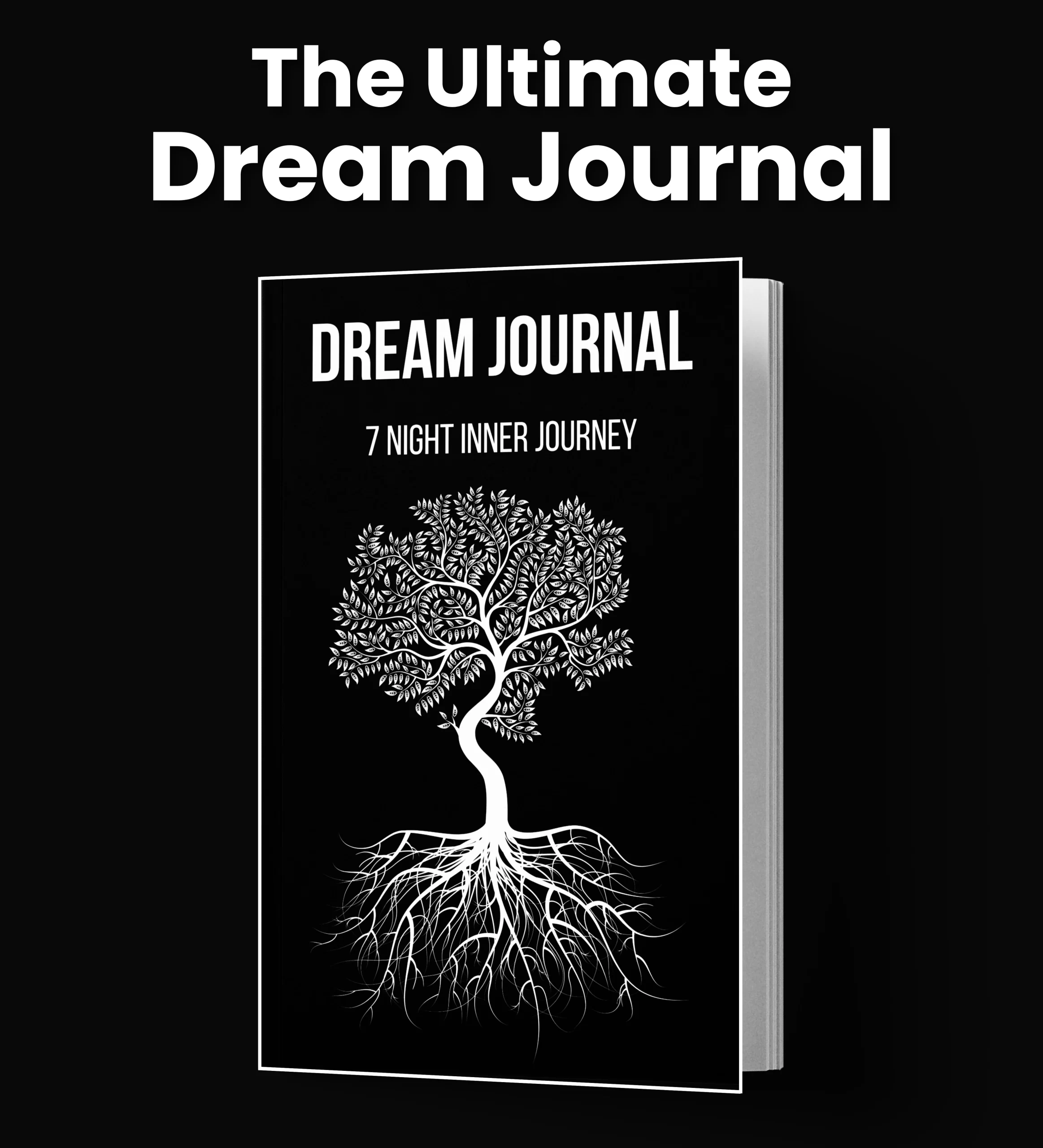“We also live in our dreams, we do not live only by day. Sometimes we accomplish our greatest deeds in dreams.”
– Carl Jung
These words of Carl Jung challenge the conventionally accepted notion that our dreams are mere fleeting illusions, incomparably less significant than our waking experiences.
For Jung, dreams are not just our brain’s nightly sorting process or a replay of yesterday’s events. They are the birthplace of myth and imagination. In our dreams, we fully enter the world of myth, in which we only subconsciously participate during the day.
Jung devoted his life to exploring the symbolic realm of dreams. At the end of his career, he had analyzed upward of 80,000 dreams.
Today, we journey into the heart of Jungian dream theory. By the end of this episode, you will understand that each dream offers a window into the hidden dimension of the world, and you will know how to tap into their deep wellspring of wisdom, creativity, and potential.
Dreams as Clues from the Unconscious
“Dreams are messages sent up from the unconscious.”
– Carl Jung
In Jungian psychoanalysis, dreams are envoys from a vast and mysterious realm that resides beneath our ordinary awareness. To comprehend the significance of dreams, we must first descend into Jung’s conceptualization of the unconscious mind.
Jung often used the analogy of a ship on the open sea to illustrate the relationship between consciousness and unconsciousness. Our conscious mind, like the deck of a ship or the visible part of an iceberg, is merely a fraction of our entire psyche.
Below the surface lies the vast and uncharted expanse of the unconscious, the submerged dimension of thoughts, feelings, memories, and archetypal patterns that rule our waking lives. Just as the unseen currents and depths of the ocean are the true captains of the ship, so too does the unconscious shape our decisions, behaviors, and perceptions.
At the root of all psychopathology is suppressing or ignoring the unconscious. Indeed, the captain of a boat would shipwreck if he did not survey the waters; he must use the currents and the winds to his advantage in order to govern his ship to where he needs to go.
As Jung famously put it,
“One does not become enlightened by imagining figures of light, but by making the darkness conscious.”
This process of shining a light on the unconscious aspects of our psyche is the process which Jung called the integration of the shadow. If you want to better understand what Jung means by the Shadow, we have an entire video where we delve into the subject.
Dreams, in Jung’s view, are the primary vehicle for the integration of the Shadow. Indeed, they are the “spontaneous self-portrayal” of the unconscious, a direct line of communication from the depths of our being. Dreams bypass the filters and defenses of our conscious ego, offering unfiltered glimpses into the inner workings of our psyche.
Through dreams, the unconscious reveals itself in a language of symbols, metaphors, and images. This is the language of myth, which Jung called the “utterance” of the unconscious. For instance, a dream about being lost in a forest might symbolize feeling confused in one’s waking life, while a dream of flying might represent a desire for freedom or transcendence.
By paying attention to our dreams and attempting to read their symbolic language, we begin to bridge the gap between the conscious and the unconscious. We start to understand the deeper meaning of recurring themes that emerge in our dreams, shedding light on our hidden motivations and unhealed wounds.
This process of making the unconscious conscious allows us to integrate these previously unknown aspects of ourselves, leading to greater self-awareness, personal growth, and a more authentic and meaningful life. In essence, dreams serve as a bridge between the conscious and unconscious: they are the way for us to descend into the depths of our psyche, and to rise back up with hidden treasures that we found within.
The Benefits of Analyzing your Dreams
“When we sleep the soul is lit up completely by many eyes; with them we can see everything that we could not see in the daytime.”
– Aeschylus, ancient Greek playwright
This poetic insight is in deep resonance with Jung’s understanding of dreams as illuminative. By paying careful attention to our dreams, we unlock a wealth of information that lies beyond the reach of our waking consciousness.
The unconscious, as Jung famously said, “is the dark being within that hears what our conscious ears do not hear, and sees what our conscious eyes do not perceive.” Dreams, therefore, offer us a second pair of ears and of eyes. In our dreams, we can unlock nocturnal vision, and see where there seemed to be only a blindspot during the day.
Dreams serve as early warning signals, alerting us to psychological and physical issues before they become manifest in our waking lives. Jung noted that “Dreams prepare, announce, or warn about certain situations, often long before they actually happen.” The unconscious has the ability to detect subtle imbalances or emerging patterns that our conscious mind, to protect itself, tries to overlook.
Dreams also serve as a source of creative inspiration. From Dmitri Mendeleev’s dream-inspired conception of the periodic table to Robert Louis Stevenson’s dream-born story of Dr. Jekyll and Mr. Hyde, history is replete with examples of how dreams have sparked breakthroughs in various fields of thought.
Jung himself attributed many of his most significant ideas and insights to his dreams, stating:
“In the end, the only events in my life worth telling are inner experiences, amongst which I include my dreams and visions.”
The Modern World’s Disconnection from the Dream World
Jung observed a troubling trend in the modern world: a growing disconnect between the conscious mind and the unconscious. He believed this disconnect was a root cause of many of the societal ills plaguing his time, and which persist, maybe in a worse form even, today. These ills include widespread neurotic illnesses, susceptibility to mass delusions and propaganda, a pervasive sense of cowardice, and a tendency towards blind obedience to authority figures.
In Jung’s view, this disconnect stemmed from modern man’s overemphasis on rationality and materialism, leading to a neglect of our instinctive and intuitive faculties. We have lost touch with the deeper wisdom of the unconscious, the ancient wellspring of human experience that connects us to our ancestors, to nature, and to the collective unconscious of all humanity.
Dreams, Jung believed, offer a vital antidote to this modern malaise. By reconnecting us with the unconscious, dreams can help restore a sense of balance and wholeness to our lives. They can awaken our dormant instincts, rekindle our intuition, and provide us with the inner strength and wisdom needed to navigate the complex and chaotic world.
“Dreams are impartial, spontaneous products of the unconscious psyche, outside the control of the will. They are pure nature; they show us the unvarnished, natural truth, and are therefore fitted, as nothing else is, to give us back an attitude that accords with our basic human nature when our consciousness has strayed too far from its foundations and runs into an impasse.”
– Carl Jung
Dreams, in this sense, are, in addition to a source of personal insight, a catalyst for societal transformation.
How to Interpret your Dreams
“As a plant produces its flower, so the psyche creates its symbols. Every dream is evidence of this process.”
– Carl Jung
Unlike the clear and logical language of our waking thoughts, the unconscious communicates in a symbolic language that can be initially challenging to decipher.
This symbolic language, of metaphors, archetypes, and psychic associations, is what makes dreams both fascinating and enigmatic. The images, characters, and scenarios that appear in our dreams do not appear in the same way as in the day. In the day, they appear in their physical form; in the night, they appear in their primordial imaginal form.
For example, a dream about falling might symbolize a fear of loss of control. A dream of being chased by an animal could represent an anxiety of being pursued by unresolved issues from the past. The key to understanding dreams lies in looking through the symbol to recognize its meaning.
Throughout his clinical career, Jung developed a comprehensive process in order to analyze and understand dreams.
It begins, of course, with recording each of our dreams. By diligently recording our dreams upon waking, we capture what we can remember of their fleeting details and emotions, preventing them from fading into oblivion. This practice not only helps us remember our dreams more vividly but also allows us to identify recurring themes and patterns over time.
If you are looking for an intuitive, powerful method to journal, track and interpret your dreams, look no further. We have created the Self dream analysis app for you. Self allows you to create your own personalized artificial intelligence model to help you decode the meaning of your dreams. You can download it now by clicking on the link in the upper right corner. See you inside!
To analyze our dreams, we must actively engage with the dream material, explore its symbolism, and connect it to our personal experiences, current challenges, and the broader cultural and archetypal context. It’s a process of unraveling the layers of meaning hidden within the dream, much like peeling an onion.
This exploration involves reliving the emotions evoked by the dream, researching the symbolism of certain images or archetypes, and considering how the dream relates to our current life circumstances. It might also involve engaging in active imagination, a technique where we consciously interact with the dream images and allow them to unfold further in our waking minds.
By analyzing our dreams, we begin to understand their deeper meaning and significance. We decipher the messages that our unconscious is trying to convey, and we gain insights into our hidden motivations, conflicts, and potentials. Jung said:
“When there is the feeling that the interpretation clicks, that it absolutely hits the fact, one knows one is on the right track.”
After we take the time to interpret our dreams, sometimes something “clicks,” we get an insight, and the meaning of our dream then seems obvious and clear as day, and we wonder how we could have missed it all this time.
Conclusion
Carl Jung’s approach to dream interpretation allows us to listen to and understand the hidden language of the unconscious. By viewing dreams not as random occurrences but as meaningful messages, we open ourselves to a deeper understanding of ourselves, of our relationships, of the collective dynamics of society, and even of the nature of the universe.
Are you ready to descend into your dream-world, to collect the hidden treasures buried beneath awareness?
If you learned a lot from this article, and want to take the next step to apply this theory into practice, then you should download the Self dream app. It is a Jungian inspired, cutting-edge and AI powered method of dream interpretation. Click the link and begin your journey today.

